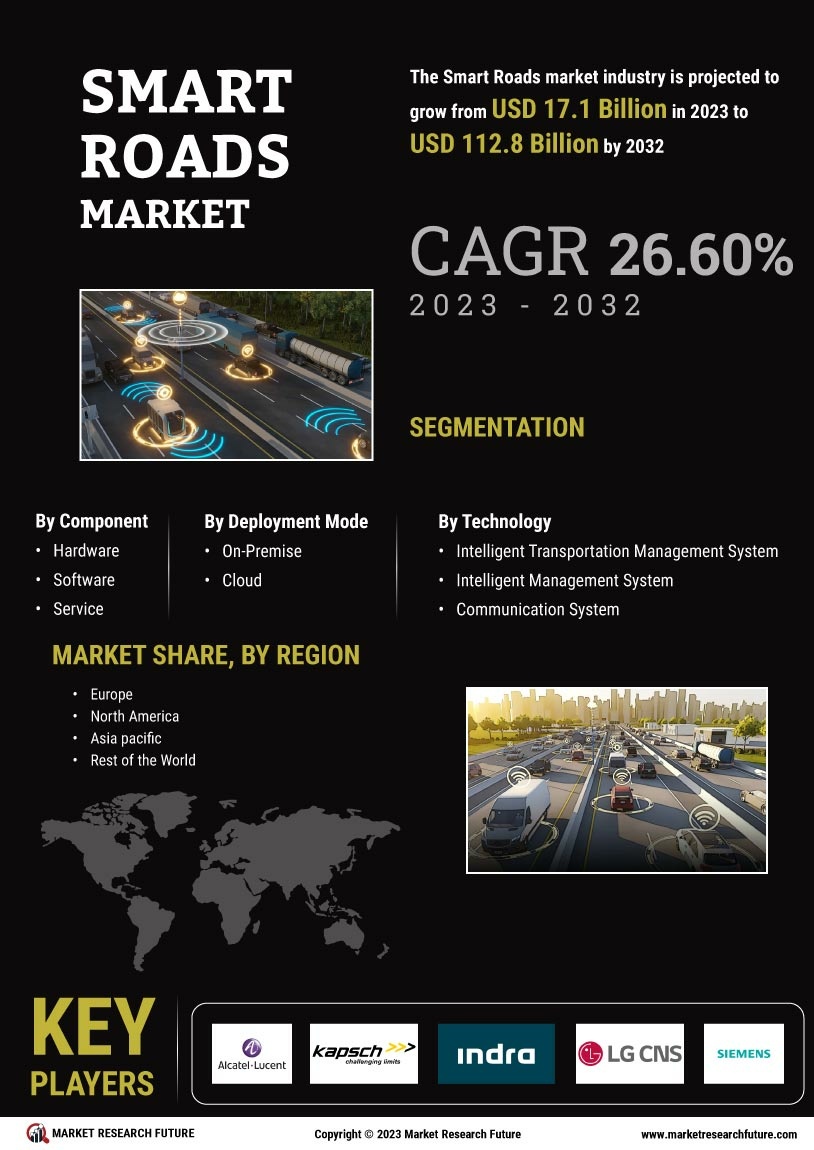Increasing Urbanization
The rapid pace of urbanization globally drives the demand for innovative infrastructure solutions, particularly in the Global Smart Roads Market Industry. As cities expand, the need for efficient transportation systems becomes paramount. Urban areas are projected to house approximately 68% of the world's population by 2050, necessitating the integration of smart road technologies. These technologies enhance traffic management, reduce congestion, and improve safety. For instance, smart traffic signals and real-time data analytics can optimize traffic flow, thereby reducing travel times and emissions. This trend is expected to contribute significantly to the market's growth, with projections indicating a market value of 21.3 USD Billion in 2024.
Market Growth Projections
The Global Smart Roads Market Industry is poised for substantial growth, with projections indicating a market value of 21.3 USD Billion in 2024 and an anticipated increase to 228.9 USD Billion by 2035. This growth trajectory reflects a compound annual growth rate of 24.09% from 2025 to 2035. The increasing adoption of smart technologies in transportation, coupled with supportive government policies and rising urbanization, contributes to this optimistic outlook. As stakeholders recognize the benefits of smart roads, including improved safety, efficiency, and sustainability, investments in this sector are likely to surge, shaping the future of transportation infrastructure.
Technological Advancements
The continuous evolution of technology plays a crucial role in shaping the Global Smart Roads Market Industry. Innovations such as the Internet of Things (IoT), artificial intelligence, and big data analytics are transforming traditional road systems into intelligent networks. These advancements enable real-time monitoring of traffic conditions, predictive maintenance of infrastructure, and enhanced safety measures. For instance, smart sensors embedded in roads can provide data on vehicle speeds and road conditions, allowing for timely interventions. The integration of these technologies is expected to drive market growth at a compound annual growth rate of 24.09% from 2025 to 2035, reflecting a strong demand for smart road solutions.
Rising Vehicle Connectivity
The increasing connectivity of vehicles is a pivotal driver for the Global Smart Roads Market Industry. With the proliferation of connected and autonomous vehicles, there is a growing need for infrastructure that can support these technologies. Smart roads equipped with vehicle-to-infrastructure communication capabilities can facilitate safer and more efficient transportation systems. For example, real-time data exchange between vehicles and road infrastructure can enhance navigation, reduce accidents, and optimize traffic flow. As the automotive industry continues to innovate, the demand for smart road solutions is expected to rise, further solidifying the market's growth trajectory.
Environmental Sustainability
The growing emphasis on environmental sustainability is significantly influencing the Global Smart Roads Market Industry. As nations strive to meet climate goals, smart road technologies offer solutions to reduce carbon footprints and promote eco-friendly transportation. Features such as electric vehicle charging stations integrated into roadways and smart traffic management systems that minimize idling times contribute to lower emissions. Furthermore, the adoption of sustainable materials in road construction aligns with global sustainability initiatives. This focus on environmental responsibility is likely to enhance the attractiveness of smart road investments, thereby propelling market growth and innovation in the coming years.
Government Initiatives and Funding
Governments worldwide are increasingly recognizing the importance of smart infrastructure, leading to substantial investments in the Global Smart Roads Market Industry. Initiatives aimed at enhancing road safety, reducing environmental impact, and improving traffic efficiency are being prioritized. For example, the U.S. Department of Transportation has allocated billions for smart transportation projects, which include intelligent transportation systems and connected vehicle technologies. Such funding not only supports the development of smart roads but also encourages public-private partnerships. This collaborative approach is likely to accelerate the adoption of smart road technologies, contributing to a projected market growth to 228.9 USD Billion by 2035.
















